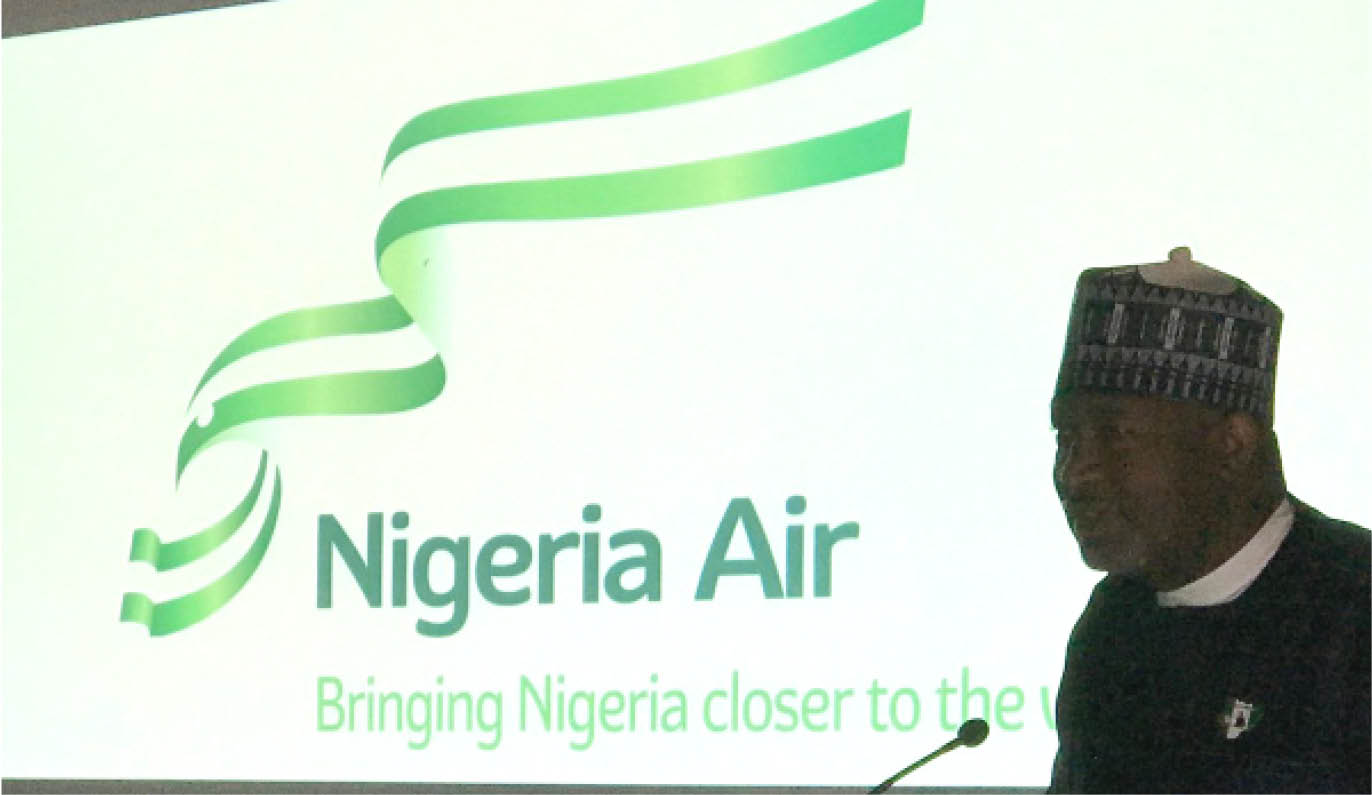Exactly three years and four months after the unveiling of the name and logo of the proposed national carrier known as Nigeria Air, the federal government has finally announced that the new national carrier will take off in April 2022.
The Minister of Aviation, Sen. Hadi Sirika, disclosed this when he, along with Ministers of Transportation, and Finance, Budget and National Planning, Rotimi Amaechi and Dr. Zainab Ahmed, respectively, briefed State House correspondents on the outcome of the Federal Executive Council (FEC) meeting, where the approval was given.
Daily Trust on Sunday reports that the Minister of Aviation, Senator Hadi Sirika, had on July 18, 2018, unveiled the name and logo at the Farnborough International Airshow in London, hinting that the airline would begin operation in December 2018 with 20 aircraft.
According to Sirika, 49 per cent of the Nigeria Air project will be owned by strategic equity partners, 46 per cent by Nigerians, while the Federal Government will own five per cent of the shares.
The minister revealed that Nigeria Air, when operational, would generate over 70,000 jobs, saying “these 70,000 jobs, they are higher than the total number of civil servants that we have in the country.”
Sirika said the government is only kick-starting the airline and handing it over to the owners to run it as a going concern devoid of government interference.
He further explained that though the airline is starting with 3 aircraft, capacity will be grown to 30 aircraft in less than five years, depending on what the investors want.
“We may hit the 30 Aircraft mark in 5years or 2 years; it depends on how they want to run their business. With what the FEC passed, the FG will have no role in the management of the airline,” he said.
He further noted that the national carrier was integrated into the Aviation Roadmap and it is a complementary procurement to all the other facilities in the Road Map like the Maintenance and Repair and Overhaul facility (MRO), the Aviation Leasing Company (ALC), and the Aerotropolis.
“The government has provided 12,000 hectares of airport land. We will have MRO there, a new terminal, MRO, etc. It will be an aerotropolis centre which will also be a free zone like the four mega airports,” he said.
He said the “MRO will be faster than the airline.” He also said the technical partners have been sourced and the ministry was waiting for FEC to approve it. “We are also targeting April 2022 for it to start. MRO is also important because it will be cheaper to maintain aircraft locally,” he said.
On the 46 per cent share reserved for Nigerian investors, he said they could access through an Initial Public Offer, private placement, or the secondary market.
However, aviation experts have expressed mixed feelings at the government’s pronouncement.
Prof. Samuel Odewunmi, a transportation expert, expressed disappointment with the manner the Federal Government is driving the national carrier project, describing it as “most catastrophic”.
“Honestly, I’m terribly disappointed,” he said.
Odewunmi, Dean, School of Transportation, Lagos State University, said the government should have concerned itself with providing a conducive environment for the local airlines to thrive.
He said, “You see the cemetery of the Nigerian Airways, you have no solution to it. You are now going into the thing again. It’s just a reflection of who we are, that one (national carrier) is unnecessary.
“What they should do is to make the environment better for the private operators. Reduce their landing charges, reduce other charges for them, then use the money to say anybody that can float a service hangar for the plane maintenance in Nigeria rather than flying our aeroplanes to Ethiopia, so that we would be able to conduct our checks in Nigeria.
An aviation analyst, Capt. Alex Nwuba, said the whole idea about it is abracadabra but said nothing is impossible where the minister who controls the NCAA is involved.
According to him, establishing a new airline cannot take less than 18 months to two years.
He said: “The whole thing is all abracadabra; nobody can explain it. You just look at it and watch to see the outcome.”
“I call this nonsense. Everything is shrouded in secrecy. Let us know what you want to do. Let people give suggestions and critique it. You want to wet-lease three aircraft, wet lease from where? We don’t know. You talk about creating 70,000 jobs. How? With three wet-lease aircraft? When you wet-lease, how many jobs have you created? You give the job to some people offshore.”
Capt. Ibrahim Mshelia, Chairman of Westlink Airlines, punctured the Minister’s claim about the national carrier creating 70,000 jobs.
He also said the project has been shrouded in secrecy, noting that transparency is key in driving any government venture.
He said, “Even before the COVID-19 heat, BA had 42,000 staff all over the world, Lufthansa had 70,000 or 80,000. These are large airlines I am talking about. KLM with 100/102 years of existence, they have just about 100,000 employees.
“Then, if you come down to our level of Kenya Airways which has just less than 5000, Etihad, a state airline for the Middle East has less than 13,000-14,000. How on earth will an airline that is a dream away, or a mirage I would say, come and employ 70,000 people?”
Mshelia also warned against circumventing any of the processes involved in the registration of an airline.
He added, “There has to be transparency in the whole exercise. He must be called to order. It would take you a minimum of 12 months to register an airline when you know the name even with government leverage because there are incubation periods for some of these certification processes.
“You need to register and when the CAC gives you a registration certificate, you need to apply for an Air Transport License (ATL) if they will be doing scheduled operations. We all know that every director has to fill a form because the ICAO-recommended practice is that all those who operate an airline must have reputable track records so we don’t have criminals doing gunrunning, money laundering, and what have you. Every director on paper must be vetted by the DSS and other security agencies. You fill a Personal History Statement (PHS) form and submit it and it would be sent to DSS who will go everywhere you put on that CV to verify.
“After the vetting, you will make an advert to last for 28 days so anyone who has an issue with the licensing of the ATL to that applicant should come up with reasons, there could be court cases going on for months or years. That should further tell you something.
“That has not been done before you get ATL so you can apply for AOC, no one needs to tell you journalists how long it takes to get AOC in Nigeria, they are not going to jump the process because it is a Nigerian project, we will not allow that, plus we are a category one CAA. They should not dare to do that, otherwise, they will lose that status.”
On his part, Capt. Roland Iyayi, the CEO, Top Brass Aviation and former managing director, the Nigerian Airspace Management Agency, NAMA said the timing for new airlines is appropriate.
“Timing of the entry may have been informed by the downturn of the industry generally, as it is a lot easier now than before to access aircraft assets cheaply. As a matter of fact, the downturn is the best time to acquire the aircraft assets.”
He also noted that the northern air market needs additional servicing. “The northern part of the country is unserviced to a large extent. Therefore, it would provide the opportunity of establishing a niche for prospective airline investors. The plan I presume would hedge the confidence of a timely recovery and niche to project viability,” he explained.
“How this plays out in the long term would be largely determined by whether or not the economy recovers expeditiously from the current depression,” he further noted.
But Capt. Alex Nwuba, President of Aircraft Owners and Pilots Association (AOPA), believes the market can’t support more airlines, saying the passengers’ figures are decreasing since the COVID-19 pandemic.
“In an industry where consumers are complaining, then you are hoping that the new ones would come and do it better, but at the end of the day, the market can’t support 25 airlines. It can’t even support 15 airlines, everybody would lose because the numbers are not going up, they have actually gone down as a result of the new COVID economy.
“Now, if people are not making money during the COVID economy, how will they make money in the post-COVID economy where supply is increasing and demand is declining? It is simple.”

 Join Daily Trust WhatsApp Community For Quick Access To News and Happenings Around You.
Join Daily Trust WhatsApp Community For Quick Access To News and Happenings Around You.


